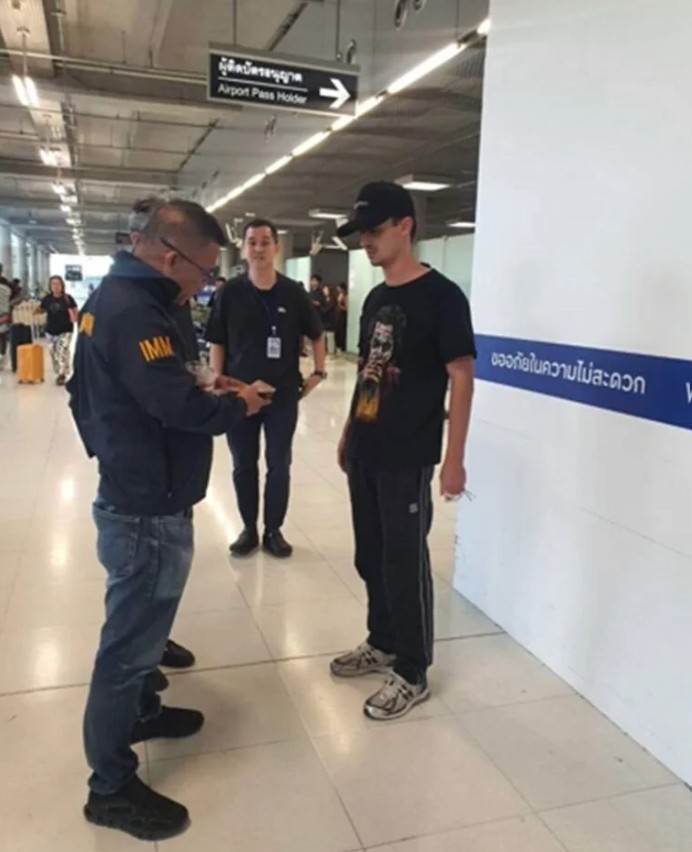Thailand Pickup Truck Original Video and Scandal of Tourist
Thailand has long marketed itself as one of Asia’s premier tourist destinations. Its pristine beaches, vibrant nightlife, rich cultural traditions, and family-friendly attractions draw millions of visitors each year. For decades, the country’s tourism industry has been a vital part of its economy, providing jobs and sustaining local businesses across the nation.

However, every so often, a shocking scandal threatens to overshadow this carefully curated image. In September 2025, such a case erupted when a viral video showed a Russian man and a Thai woman a moving pickup truck in Phuket. The clip, only 15 seconds long, ignited a nationwide uproar, sparked debates on morality and law enforcement, and placed Thailand’s international reputation under intense scrutiny.
The story quickly developed into more than just a viral scandal. It became a flashpoint for broader questions about how Thailand manages the conduct of foreign tourists, the adequacy of existing laws, and the fine balance between welcoming visitors and preserving cultural values.
Contents
The Viral Video Incident
The controversy began on September 26, 2025, when footage filmed in Phuket surfaced on Thai social media platforms. The short clip depicted a 23-year-old Russian man, later identified only as Georgii, and a 42-year-old Thai woman. Other motorists were clearly visible nearby, raising concerns that bystanders including children could have easily witnessed the scene.
The uncensored video of a foreign tourist in Thailand has sparked outrage across social media
Further investigations revealed that the woman had been offered 1,000 baht, approximately RM130 or USD 27, to participate. During questioning, she admitted that Georgii had assured her the video was intended for his online Russian audience.
What shocked the public was not only the indecency of the act but also its blatant disregard for public decency in a conservative society. Thailand takes public morality seriously, and such actions, particularly when committed in broad daylight on a busy road, are considered a violation of both legal boundaries and cultural respect.
Arrest and Legal Proceedings
Thai authorities moved swiftly to contain the scandal. Just one day after the video went viral, on September 25, police apprehended Georgii at Bangkok’s Suvarnabhumi Airport. Reports suggest he was attempting to flee the country before the controversy escalated further.

Georgii was charged with public indecency, an offense that typically carries a modest penalty in Thailand. However, the case had the potential to escalate significantly. Officials pointed out that if prosecutors determined the video had been shared online for profit, Georgii could face charges under the country’s strict Computer Crime Act.
Immigration authorities also weighed in, considering the possibility of revoking Georgii’s visa and placing him on a permanent blacklist to prevent future entry into Thailand.
Law enforcement officials made clear that they intended to treat the matter seriously. Phuket tourist police chief Lieutenant-Colonel Ekachai Siri confirmed that the charges would not be taken lightly. Meanwhile, Colonel Chatree Chukaew, chief of Muang Phuket Police Station, publicly declared that foreign visitors who disregard Thai laws and morals must face consequences.
“This type of obscene act in public not only violates our laws but disrespects our country,” Colonel Chatree said in a statement. “Foreign visitors who behave in such a manner must face consequences to protect our reputation and the safety of our society.”
Government and Law Enforcement Stance
Beyond the immediate case, Thai officials expressed frustration with the broader trend of tourists engaging in indecent behavior. Senior police officers advocated for tighter immigration controls, arguing that blacklisting Georgii would send a strong signal to others.
The government’s concern was not just about enforcing morality but also about safeguarding Thailand’s international reputation. Tourism remains one of the country’s economic lifelines, and incidents like this threaten to paint Thailand as a permissive destination where laws are not properly enforced.
By adopting a tough stance, authorities aimed to reassure both local citizens and the global community that Thailand would not tolerate disrespectful or illegal behavior from visitors.
Public and Social Media Reaction
If the police and government responses were firm, the public reaction was nothing short of explosive. Social media platforms such as Facebook and X (formerly Twitter) were inundated with angry posts, memes, and calls for punishment.
One furious user demanded immediate action: “Catch them and deport them immediately. They should be blacklisted forever.” Another expressed worry about children potentially witnessing the act, writing: “The only thing I’m concerned about is young witnesses on the road. Punish them harshly, not just with a fine.”
A recurring theme in online discussions was the inadequacy of current penalties. Many users argued that a fine of 5,000 baht (around USD 140) for public indecency was far too lenient, especially when the act had already spread worldwide through digital platforms. Others insisted that officials needed to set an example by implementing harsher punishments for foreign offenders.
For many Thais, the scandal was not simply a legal violation. It was seen as an act of cultural disrespect. In a society that places high value on public order and respect for traditions, the video represented a violation of national dignity.
A Pattern of Tourist Misconduct
While the Phuket pickup truck scandal was shocking, it was far from unprecedented. In 2024, two foreign visitors were caught on video a beach in Pattaya one of Thailand’s most famous tourist destinations marketed as a family-friendly location. That case, too, generated national outrage and calls for tougher legal action.
These incidents reveal a recurring challenge for Thailand: the clash between certain tourists’ behavior and the nation’s emphasis on cultural respect and morality. Experts note that Thailand’s vibrant nightlife, coupled with its reputation as a hub for adult entertainment, attracts millions of visitors every year. However, this very notoriety often fuels misconduct, leading to scandals that undermine the country’s efforts to present itself as both welcoming and respectable.
Tourism and Cultural Implications
The incident also reignited debates about how such scandals might affect Thailand’s tourism industry. Tourism accounts for a significant portion of Thailand’s GDP, supporting millions of jobs nationwide. Maintaining the country’s image as a safe, family-friendly destination is therefore not just a matter of pride but also of economic necessity.
Local residents have expressed fears that recurring scandals could damage this image. Some worry that families from abroad may begin to view Thailand as permissive or unsafe. As one social media commenter wrote: “If Thai officials ignore this case, the country will be embarrassed. Don’t let them insult us.”
The case also raised important policy questions:
Should Thailand impose harsher penalties for public indecency?
Should immigration rules be restructured to immediately ban offenders?
How can the government balance the economic benefits of tourism with the need to uphold cultural values and legal standards?
For many citizens, the answer lies in stricter enforcement. The Phuket scandal has intensified calls for more police patrols in tourist-heavy areas and closer coordination between local law enforcement and immigration services.
The arrest of Georgii, the 23-year-old Russian tourist at the center of the Phuket pickup truck scandal, highlighted the challenges Thailand faces in regulating tourist behavior. What began as a 15-second video escalated into a national controversy, sparking outrage, fueling debates over morality, and pressuring authorities to take decisive action.
By charging Georgii with public indecency and exploring possible violations under the Computer Crime Act, Thai officials demonstrated their determination to deter similar incidents in the future. Immigration authorities’ consideration of deportation and blacklisting further emphasized the seriousness of the case.
For the Thai public, however, the message is clear: leniency is not an option. In the digital age, where a single clip can spread across the globe within hours, protecting the nation’s image requires strict enforcement.
Ultimately, the Phuket scandal serves as a cautionary tale. For Thailand, it is a reminder of the delicate balance between welcoming millions of international visitors and preserving the values, traditions, and decency that define its society. For tourists, it is a stark warning: respect the culture, obey the laws, or face serious consequences.
Breaking News -Trout Lady Full Video and Controversy on Reddit, X-Twitter
Sean Herman Video Reveals Concerns Over Police Conduct
Katie Price Dubai Photo and Highlights Risks
Pan Piano Video Leak Causes Stir in Online Communities
Christine Chubbuck Video Sparks Debate on Journalism Ethics
Prison Officer Wandsworth Video Leak in Prison Chaos
Georgie Cooper Video Leak and Community Reactions
